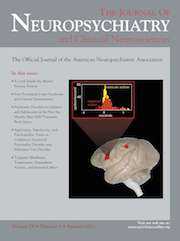Low-Dose Quetiapine for the Treatment of Delusional Disorder in a Patient With Von Hippel-Lindau Disease
To the Editor: Von Hippel-Lindau (VHL) disease1 is an autosomal, dominantly-inherited disorder caused by germline mutations in the VHL tumor-suppressor gene (TSG) that predispose to the development of retinal and central nervous system hemangioblastomas, clear-cell renal carcinoma, and pheochromocytoma. Quetiapine, a dibenzothiazepine derivative antipsychotic has been used in the treatment of schizophrenia and related disorders.2,3 We report on a case of delusional disorder along with VHL disease and its treatment with low doses of quetiapine without any considerable side effects. No such report has been described before.
“Mr. A.,” 29-year-old married man, was admitted with a history of agitated behavior and episodes of unresponsiveness with urinary incontinence. He also had partial blindness, motor in-coordination, and dysarthria. He was diagnosed as a case of Von Hippel-Lindau (VHL) disease 9 years earlier. He was operated on for cerebellar hemangioblastomas, but his vision could not be restored. Since then, he was dependent upon family members for activities of daily living. For the last 4 years, he was reported to abuse and suspect his wife, with occasional physical fights with her. This delusional belief had intensified with time and exacerbated with deterioration in his physical condition. He also started showing lability of mood, anger outbursts, and explosive reactions to trivial matters.
On exploration, it was revealed that the patient’s paternal grandfather, paternal uncle, paternal aunt, and younger brother also had history of VHL disease and suspiciousness toward their spouses. Initial evaluation revealed that he remained agitated and insisted that his mother stay by his side throughout. In addition to pancreatic and renal cysts on ultrasonography of abdomen, MRI of brain showed cerebellar and retinal hemangioblastomas, with two new angioblastomas. All investigations (blood sugar, liver function, kidney function, serum electrolytes, lipid profile, thyroid function, chest X-ray, ECG, and EEG) were grossly within normal limits. Mini-Mental State Exam (MMSE) score was 30/30. On serial mental state examinations, the patient expressed delusions of infidelity against his wife, which started after marriage. This led to frequent altercations between the patient and his wife within the ward setting, as well. A diagnosis of organic delusional disorder (ICD-10) was entertained because of the chance association of brain lesions of VHL disease.
Mr. A was started on quetiapine 50 mg once a day and gradually increased to 200 mg/day over a month without any side effects. His aggression and violent behavior improved over a period of 2 weeks. He showed a significant improvement in delusional beliefs against his wife. Divalproex sodium 1,000 mg per day was added by a neurologist as a prophylactic antiepileptic drug. He was discharged from the hospital after a period of 6 weeks. Currently, the patient is maintaining well on 200 mg/day of quetiapine, with no delusional beliefs or any aggressive episodes. He is scheduled for a gamma-knife surgery for the new angiomas in the near future.
Brain tumors have been reported to present with paranoid delusions.4,5 Post-surgery anatomical deficits (diaschisis) and angioblastomas may be associated with delusional presentation of this case. Clinicians should be aware that even delusional disorder associated with organicity can be adequately treated with quetiapine in this case. This case also proves that quetiapine at low doses produces complete remission of delusional disorder, even in a case of VHL disease, without any side effects.
1 : von Hippel-Lindau disease: a clinical and scientific review. Eur J Hum Genet 2011; 19:617–623Crossref, Medline, Google Scholar
2 : Quetiapine in the treatment of schizophrenia and related disorders. Neuropsychiatr Dis Treat 2007; 3:219–235Crossref, Medline, Google Scholar
3 : Quetiapine for hypersexuality and delusional jealousy after stroke. J Clin Psychopharmacol 2006; 26:331–332Crossref, Medline, Google Scholar
4 : Neuropsychiatric aspects of brain tumors, in Kaplan & Sadock’s Comprehensive Textbook of Psychiatry, 9th Edition, vol. 2. Edited by Sadock BJSadock VARuiz P. Baltimore, MD, Lippincott Williams & Wilkins, 2009, pp 435–451Google Scholar
5 : Metachronous occurrence of multifocal phaeochromocytoma. Indian J Pediatr 2011; 78:620–622Crossref, Medline, Google Scholar



